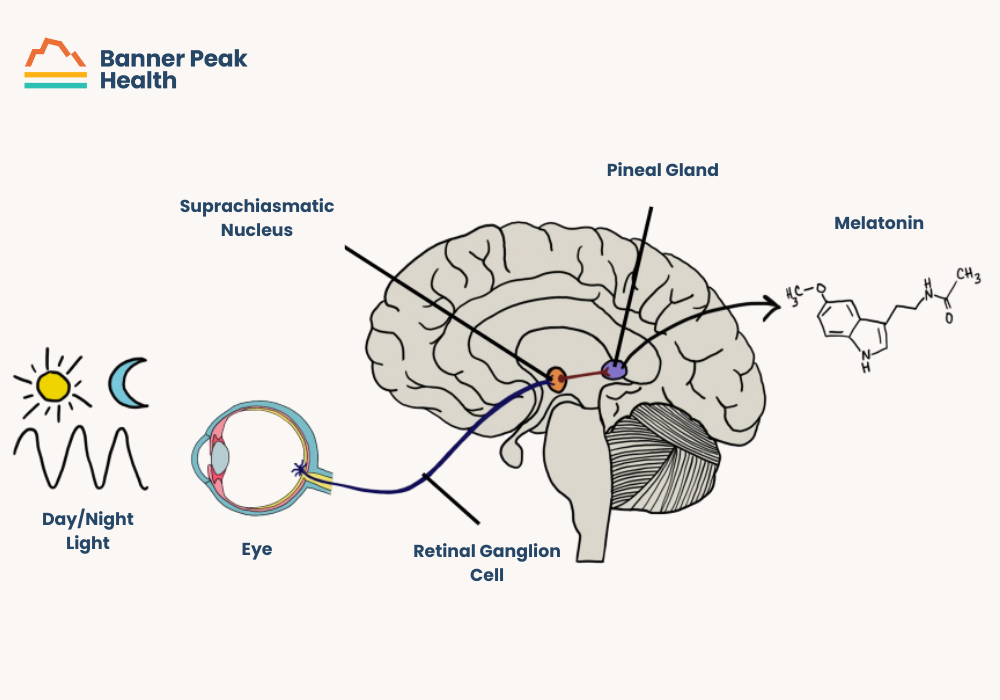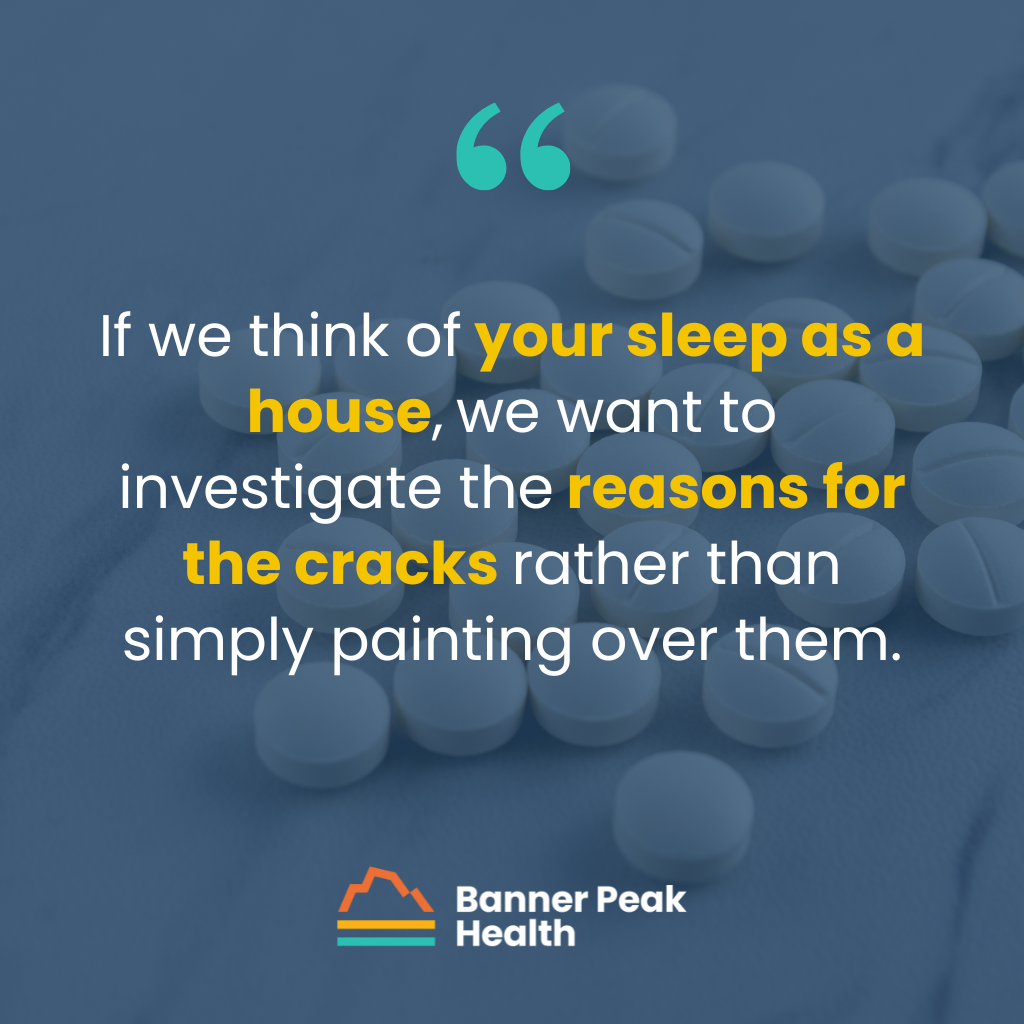Can’t sleep? Do you finally get to sleep but can’t stay asleep? You’re not alone.
Millions of people experience sleep disruption, insomnia, or some form of sleep disorder. They take sleeping pills and supplements in the hopes of solving their sleepless nights, only to find themselves more exhausted.
What about melatonin? It’s all natural, right? It must be better than Benadryl! But how much should you take? And how long does melatonin stay in your system?
These are important questions to ask before taking any medication or supplement, and we’ve got the answers.
What Is Melatonin?
First discovered in 1958, melatonin is a hormone manufactured by a part of the brain called the pineal gland. Here’s how the process works:
- We have special non-image receptors in the back of our retinas that perceive light and darkness.
- As these receptors detect darkness, they send a signal to the brain region called the suprachiasmatic nucleus.
- The suprachiasmatic nucleus triggers the pineal gland to secrete melatonin.

Melatonin is the “hormone of darkness.” It helps to synchronize our circadian rhythm (i.e., internal clock) with the light and darkness of the world around us.
Melatonin as a Supplement
Since melatonin is a crucial hormone for normal biological function, its use as a supplement has become popular in recent years for various reasons.
The global market value for melatonin supplements in 2022 was $2.15 billion, projected to increase to $8.64 billion by 2032.
The literature on the efficacy of melatonin supplements varies. Some studies show benefits, and others show none. The key component to consider is the root cause of insomnia.
For example, melatonin can be helpful for people with delayed sleep phase disorder (aka “night owls”) because it’s a circadian rhythm issue — tied to when your body makes melatonin.
If we think of your sleep as a house, we want to investigate the reasons for the cracks in the walls rather than simply painting over them.
Most prescription medications are like paint: They cover the cracks but don’t repair them. We want to find and fix the root cause of the damage.
Causes for insomnia can include medication side effects, unresolved pain, associated mental health challenges (e.g., anxiety, depression, PTSD), substances (e.g., nicotine, alcohol, caffeine), and more. A sleeping pill doesn’t address any of these.
Who Might Melatonin Be Helpful For?
Since it’s a natural hormone, melatonin naturally affects our circadian rhythm, helping to correct circadian rhythm disorders.
Here are some examples of people for whom melatonin can be helpful:
- Night owls can use melatonin to adjust their sleep habits and improve insomnia.
- There is both individual and age-related variability among night owls. Teenagers are naturally night owls due to hormonal changes during that life stage.
- People experiencing jet lag can use melatonin to recover faster.
- Studies have shown that melatonin can improve sleep disorders associated with Parkinson’s and Alzheimer’s. Both have reduced melatonin production as a part of the disease.
What if You’re Not in One of Those Categories?
The literature supporting the use of melatonin supplements is slim. However, it’s a remarkably safe compound — much safer than prescription (e.g., Ambien or Lunesta) or OTC sleeping aids (e.g., Benadryl, aka diphenhydramine).
When we look at the risk vs. benefit ratio, the benefits far outweigh the risks. That said, there are some potential side effects to be aware of. These include:
- Daytime sleepiness
- Change of mood
- GI disturbance
- Nightmares
- Headache
- Dizziness
- Nausea
Remember that the FDA doesn’t regulate supplements. So, if you want to try melatonin as a supplement, be aware and informed.
A study from 2017 found that the content of melatonin measured in the products varied dramatically (between -83% to +478%) from the amount listed on the package labels.
How Long Does Melatonin Stay in Your System?
Like many medical questions, the answer to “How long does melatonin stay in your system?” is “It depends.”
According to one small study, melatonin remained in the subjects’ systems for an average of five hours. However, at higher doses (>50pg/ml), it took as many as 10 hours to leave the bloodstream completely. At 10 hours, the dose may extend into post-awakening hours and affect other activities.
However, as we mentioned, there are very few studies on melatonin, and this study, although controlled and randomized, had only 56 participants. We need more larger studies to learn definitive answers about melatonin and its effects and applications.
Melatonin Use Cases and Recommendations
Currently, the most common use cases for melatonin supplements are:
Delayed Phase Sleep Disorder
People with insomnia have a difficult time falling asleep. For them, we suggest an extended-release supplement four hours prior to the desired bedtime.
This mirrors the physiology of our endogenous hormone, melatonin, inducing sleep. It builds slowly over time and signals a natural bedtime.
Additionally, we recommend blue light-blocking glasses. This is because blue light signals our body to suppress melatonin. Tip: Blue light-blocking glasses must be amber-colored. If the lenses are clear, they aren’t strong enough to block all blue light.
We suggest wearing the glasses two hours before bedtime and not removing them until you close your eyes. People in this group include:
- Teens
- Night owls
- People with anxiety
- People with fibromyalgia
Preterminal Insomnia
These people wake up in the middle of the night and have trouble staying asleep. The best way to use melatonin to treat this form of insomnia is to absorb it as quickly as possible.
I recommend low-dose, 1mg lozenges — break one in half or quarters. You really only need a small fraction of the 1mg.
Keep the broken lozenges at your bedside so you can stay in darkness and relax until it kicks in. It may take up to 20 minutes, but the benefit is that it won’t cause daytime sedation. The people most often affected by preterminal insomnia are:
- People with anxiety
- People with jetlag
Melatonin Supplement Recommendations
For most people, less is more. We suggest a dose of between 600 micrograms (mcgs) and one milligram (mg) for most people taking a melatonin supplement. Patients with Parkinson’s or Alzheimer’s may benefit from a higher dosage, 5–10 mgs, to compensate for their bodies impaired ability to make melatonin.
We recommend these two brands* of melatonin supplements:
- Short-acting: Source Naturals Sleep Science® Melatonin
- Time-release: Life Extension Melatonin Six Hour Time Released Vegetarian, 300 MCG
*Not affiliated or sponsored
Since the literature on this topic comes up short, I base these recommendations on my decades of personal and professional experience.
Today’s Takeaways
- Before taking any sleep supplement or medication, determine the root cause of your sleep disorder.
- If you need a supplement to help with sleep, melatonin is safer than many alternatives.
- If you use melatonin, decide whether you need a fast-acting or slow-release formula. This depends on your use case.
- How long does melatonin stay in your system? It depends. The average is around five hours, but it can be up to 10, so tread carefully and remember that less is more.
If you have questions about melatonin or sleep medicine, reach out anytime. We’re here to help!

Barry Rotman, MD
For over 30 years in medicine, Dr. Rotman has dedicated himself to excellence. With patients’ health as his top priority, he opened his own concierge medical practice in 2007 to practice medicine in a way that lets him truly serve their best interests.





